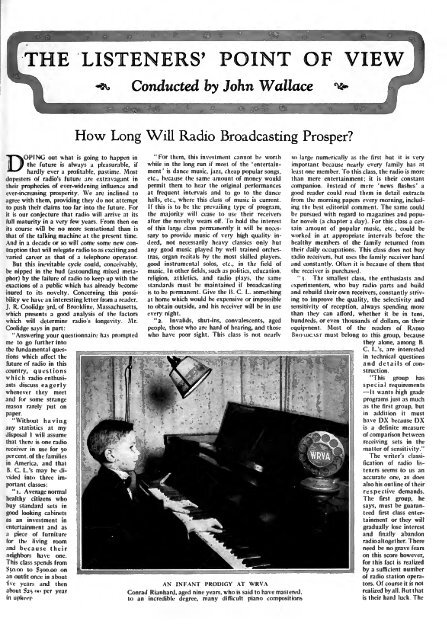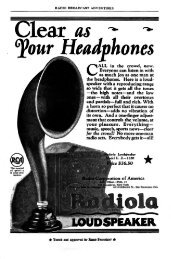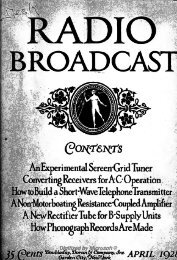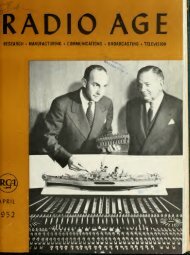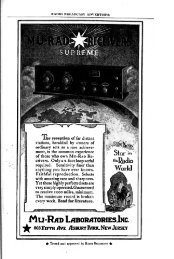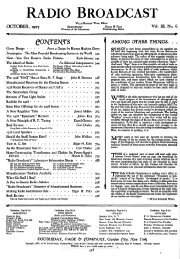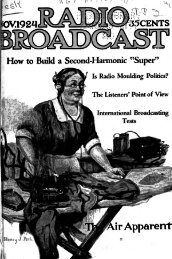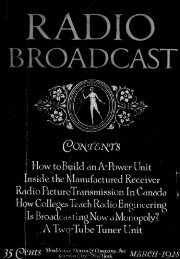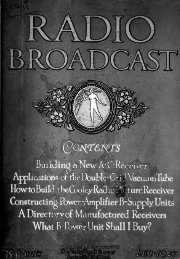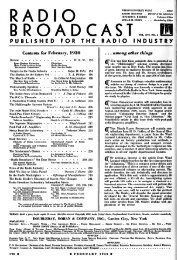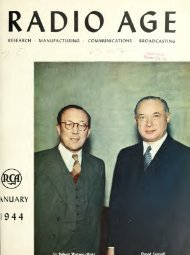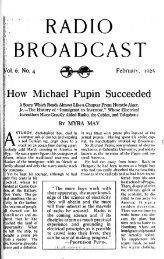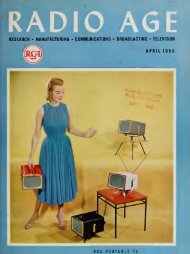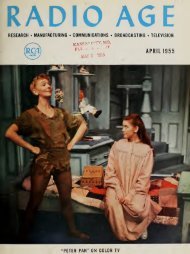28 RADIO BROADCAST MAY, <strong>1927</strong>The cases of storage batteries are now so welldesigned that they are usually quite sanitary.Hydrometers are equipped with non-drip pointsso that keeping the battery clean is reduced toa small labor. Another convenient form of hydrometer,as stated previously isdesigned aspart of the vent caps, to be screwed permanentlyinto the top of the cell cases. This type eliminatesthe risk of dripping electrolyte, whichdamages carpets and furniture. If acid sometimesgets on the outside of the battery, it canbe taken up with blotting paper or witha cloth which has first been soaked in ammonia.Local chemical action forms a coating onthe terminals of the battery as a resultof moisture or spray from overcharging. Thisshould be carefully removed by means of sodawater applied with an old tooth-brush, followedby final cleaning with a file or scraper. Thisprecaution is apt to be slighted and is often thecause of receiving set noises. After cleaning theterminals and connecting clips, cover them withvaseline. It will keep them uncorroded for aperiod of several months.When a trickle charger or A-battery socketpower unit is not employed, other types of chargersare available. Those of the vibrator typeare the least expensive. They have the disadvantageof causing noise and, if the vibratorcontacts stick, feeding alternating current intothe storage battery. New contacts are easilyinstalled at low cost and a fine file can be usedto keep the contacts smooth and fairly silent.Electrolytic chargers of various kinds can bepurchased separately or in combination withsmall storage batteries, forming a socket powerunit. These require the addition of distilled waterabout as frequently as the storage battery itselfneeds it and, generally after a year or two of use,renewal of the active electrode. Occasionally newacid is needed for the rectifier and that is best renewedat a battery service station, usually at thecost of a dollar or two.Bulb rectifiers are generally of the two-ampereor five-ampere type. A bulb is usually good fortwo thousand or three thousand hours of charging.For example, a set which requires a twentyfiveampere-hour storage battery supply a weekcan be recharged and maintained by five hourscharging a week from a five-ampere charger. Thisis the average A power requirement of a fourtubestorage battery set used about three hours aday. A charger bulb used in this modest servicewould last for many years. In trickle chargerservice, however, the bulb would be in use about140 hours a week instead of but five and wouldtherefore last only five or six months. The bulbdepreciates as rapidly when furnishing halfan ampere as when furnishing two amperes.Some trickle charger outfits are fitted withbulb chargers. Only when the current drainfrom a storage battery is so large, by the use of amulti-tube set for many hours a day, is a tricklecharger of such large capacity necessary. Otherwisethe overcharge danger, towhich we have already referredat length, occurs, and the lifeof the charger bulb is reduced toa matter of months, unless thetrickle chargeris disconnectedfrom the line a good part ofthe time. For example, a halfampererate, supplied fortyhours a week, instead of theentire time the set is not inuse, may tenfold the life of therectifier tube, cut the electricpower required to one tenth,and greatly increase the life ofthe storage battery, by avoidingcontinued overcharging.Since the crux of the whole matter of storage tery, supplies about half an ampere; four suchwatt lamp, connected with a six-volt storage bat- observing the following:battery life and economyis a matter of correct lamps in parallel will deliver two amperes.charging rate so as to assure ample current in the The circuit diagram on this page shows thebattery when you need it but not at the cost of correct circuit connections.continued and damaging overcharging, it may be Two precautions should invariably be observedwhen charging storage batteries. First, beof advantage to suggest a simple charging policywhich meets the requirements of the average certain that the positive or plus, charger lead isindivijual.connected with the red, plus, or positive A-With bulb type chargers (whether combined incharger units or not) it is preferable to usebattery terminal and that the negative chargerlead is connected with the minus A-battery terminal.Second, disconnect the radio set fromthe two-ampere rate on the required number ofovernight charges per week necessary to keep the the A battery terminals, unless you are absolutelystorage battery in condition. Experience willcertain that the power line is not short-determine whether one night a week or two circuited through the charger.nights a week is sufficient to keep the battery in To determine the polarity of the power linegood condition, showing full charge at the end of leads when charging through a bank of lampsthe charging period and still giving reasonable plunge the terminals to be connected withservice voltage before charging is begun again. the battery into a glass of salt water solution.Five-ampere chargers bring the battery back Bubbles will rise from the negative terminal.into condition quickly, but they offer a rate Rectifiers of the electrolytic and bulb type havewhich is generally a little high for radio receiving plain markings, usually employing a red wire forrequirements. A high charging rate means more the positive lead.intensive chemical action with consequently Many misleading statements have been madeintensified deterioration of the plates.as to the cpst of battery maintenance.ServiceWith chemical types, low charging rates are stations charge from fifty cents to one dollar forgenerally available. Perhaps the easiest policy to charging a radio battery and, if this service ispursue is to use a low charging rate during the required twice a month, the cost comes to one orweek, which seems to keep the set going satisfactorilytwo dollars a month, plus inconvenience andunder ordinary conditions, without "time out" because the set is not in service.permitting the storage battery to reach a nearly Chargers of various types are generally advertiseddischarged condition at any time. It may beas drawing negligible current from thebelow full charge a good part of the time without line but this is not always true. The most efficientdanger so long as it is not showing a specific way tochargea battery is with a standard chargergravity below 11503! any time. Then, over the capable of supplying several amperes say twoweek-end, give it a high charging rate, Such chargers draw 25 or 30 watts from the lineif that isnecessary to bring it to the full charge condition. so that, if used five hours a week, only about oneIf the set is used for prolonged periods, one or seventh of a kilowatt, costing from two to threetwo nights during the week, so that the balanced cents depending upon the locality, will be used.condition is upset, restore the battery to its Trickle chargers draw from 5 to 20 watts fromnormal condition by a few hours at a high chargingthe line, the average being about 10 watts.rate.Assuming you use a set three hours a day, thisThere may be occasions when a low trickle means about 630 hours of non-use a monthcharge rate keeps the battery constantly at full which, at 10 watts, means 6.3 kilowatt hourscharge and the renewal of distilled water is found The average rate is ten cents a kilowatt hour sinecessary more frequently than once a month. that the upkeep cost for electric power is aboutThis indicates continued overcharging and sixty three cents a month. The chemical type ofshould be avoided by disconnecting the trickle charger is somewhat more efficient than the bulbcharger from the set one or two days a week. type when they are used for trickle charging and,When some such formula, which gives the balancedfor this reason, from the standpoint of economy,condition, is established, storage battery the electrolytic type is preferable although thismaintenance becomes a simple and easy matter.advantage is offset by the fact that the chemicaltype requires more care in its upkeep than doesCONCLUSION ABOUT CHARGINGthe bulb type.Since it isadvantageous to disconnect theTHOSE few areas served by direct current,IN charger if it subjects the battery to overrectifiers are not suited to storage battery charge, we find in power economy an addedcharging. The only thing requiredis some form argument for disconnecting the trickle chargerof resistance so as to reduce the current supplied two or three days a week. In this way currentto the battery during charge to the value which it cost, with practically any type of charger, mayrequires for the purpose. A convenient form of be reduced to less than a dollar a month.resistance is an electric light bulb connected in We therefore find that A power satisfaction,series with the battery, of a wattage determined with due consideration to convenience, economy,by the battery's charging requirements. A fifty-and reliability, is most readily attained byCHARGING WHERE D. C. IS AVAILABLEFour 50-Watt Bulbs >Phis is a very simple arrangement, no rectifier ortransformer being necessary. The charging rate dependsupon the number of lamps. An ideal arrangementof trickle charging where d. c. is used would beto connect the storage battery in series with an ordinary5O-watt lamp used for illuminating purposes inthe living room. This would give an half-amp, rate.2 Amp' charging rats1. Use a charging system.whether trickle or high-rate,which balances the loadfrom the battery.2. Keep the electrolyte levelof rectifier and storage batteriescorrect by the additionof distilled water.I he first rule may requireoccasional disconnection of thetrickle charger or the use of ahigher charging rate for limitedperiods. The reward for obeyingthese most simple precautionsis unfailing and reliable Abattery service at low cost.
THE LISTENERS' POINT OF VIEWConducted by John WallaceHow Long Will <strong>Radio</strong> <strong>Broadcast</strong>ing Prosper?kOPING out what isgoing to happen inthe future isalways a pleasurable, ifhardly ever a profitable, pastime. Mostdopesters of radio's future are extravagant intheir prophecies of ever-widening influence andever-increasing prosperity. We are inclined toagree with them, providing they do not attemptto push therr claims too far into the future. Forit is our conjecture that radio will arrive at itsfullmaturity in a very few years. From then onits course will be no more sensational than isthat of the talking machine at the present time.And in a decade or so will come some new contraptionthat will relegate radio to as exciting andvaried career as that of a telephone operator.But this inevitable cycle could, conceivably,be nipped in the bud (astounding mixed metaphor)by the failure of radio to keep up with theexactions of a public which has already becomeinured to it;-novelty. Concerning this possibilitywe have an interesting letter from a reader,I. R. Coolidge jrd, of Brookline, Massachusetts,which presents a good analysis of the factorswhich will determine radio's longevity. Mr.Coolidge says in part:"Answering your questionnaire has promptedme to go further intothe fundamental questionswhich affect thefuture of radio inthiscountry, questionswhich radio enthusiastsdiscuss eagerlywhenever they meetand for some strangereason rarely put onpaper."Without havingany statistics at myIdisposal will assumethat there is one radioreceiver in use for 50nt. of the familiesin America, and thatB C. L.'s may be dividedinto three importantclasses:"i. Average normalhealthy citizens whobuy standard sets ingood looking cabinetsas an investment inentertainment and as-ipiece of furniturefor the living roomand because theirneighbors have one.This class spends from^i to $300.00 onan outfit once in aboutlive years and then.ihout 825 oo per yearinupkeep" For them, this investment cannot be worthwhile in the long run if most of the 'entertainment'is dance music, jazz, cheap popular songs,etc., because the same amount of money wouldpermit them to hear the original performancesat frequent intervals and to go to the dancehalls, etc., where this class of music is current.If this is to be the prevailing type of program,the majority will cease to use their receiversafter the novelty wears off. To hold the interestof this large class permanentlyit will be necessaryto provide music of very high quality indeed,not necessarily heavy classics only butany good music played by well trained orchestras,organ recitals by the most skilled players,good instrumental solos, etc., in the field ofmusic. In other fields, such as politics, education,religion, athletics, and radio plays, the samestandards must be maintained ifbroadcastingis to be permanent. Give the B. C. L. somethingat home which would be expensive or impossibleto obtain outside, and his receiver will be in useevery night."2. Invalids, shut-ins, convalescents, agedpeople, those who are hard of hearing, and thosewho have poor sight. This class is not nearlyAN INFANT PRODIGY AT WRVAConrad Rianhard, aged nine years, who is said to have mastered,to an incredible degree, many difficult piano compositionsso large numerically as the first but it is veryimportant because nearly every family has atleast one member. To this class, the radio is morethan mere entertainment; it is their constantcompanion. Instead of mere 'news flashes' agood reader could read them in detail extractsfrom the morning papers every morning, includingthe best editorial comment. The same couldbe pursued with regard to magazines and popularnovels (a chapter a day). For this class a certainamount of popular music, etc., could beworked in at appropriate intervals before thehealthy members of the family returned fromtheir daily occupations. This class does not buyradio receivers, but uses the family receiver hardand constantly. Often it is because of them thatthe receiver ispurchased."}. The smallest class, the enthusiasts andexperimenters, who buy radio parts and buildand rebuild their own receivers, constantly strivingto improve the quality, the selectivity andsensitivity of reception, always spending morethan they can afford, whether it be in tens,hundreds, or even thousands of dollars, on theirequipment. Most of the readers of RADIOBROADCAST must belong to this group, becausethey alone, among B.C. L.'s, are interestedin technical questionsand details of construction."This group hasspecial requirementsIt wants high gradeprograms just as muchas the first group, butin addition it musthave DX because DXis a definite measureof comparison betweenreceiving sets in thematter of sensitivity."The writer's classificationof radio listenersseems to us anaccurate one, as doesalso his outline of theirrespective demands.The first group, hesays, must be guaranteedfirst class entertainmentor they willgradually lose interestand finally abandonradioaltogether. Thereneed be no grave fearson this score however,for this fact is realizednumberby a sufficientof radio station operators.Of course it is notrealized byall. But thatis their hard luck. The
- Page 1 and 2: RADIO BROADCASTVOLUME XIMAY, 1927,
- Page 3 and 4: INDEX.ContinuedPAGEThreshold of Hea
- Page 5 and 6: RADIO BROADCAST ADVERTISERALUMINUMB
- Page 7 and 8: RADIO BROADCAST ADVERTISERfIA REALA
- Page 9 and 10: :RADIO BROADCASTVOLUME XI NUMBER 1M
- Page 11 and 12: MAY, 1927WITH MACMILLAN TO THE ARCT
- Page 13: THE MARCHInterpretation of Current
- Page 16 and 17: 18volved the law in precarious lega
- Page 18 and 19: The ElectricalA Non-Technical Expla
- Page 20 and 21: 22 RADIO BROADCAST MAY, 1927type of
- Page 22 and 23: A Balanced Short-Wave ReceiverA Des
- Page 24 and 25: What About the A BatteryThe Importa
- Page 28 and 29: 30 RADIO BROADCAST MAY, 1927NO STRA
- Page 30 and 31: 32 RADIO BROADCAST MAY, 1927from th
- Page 32 and 33: 34 RADIO BROADCAST MAY, 1927the ave
- Page 34 and 35: AS THE BROADCASTER SEES ITDrawings
- Page 36 and 37: 38 RADIO BROADCAST MAY, 1927Interes
- Page 38 and 39: Some Facts About Coil DesignThe Osc
- Page 40 and 41: 42 RADIO BROADCAST MAY, 1927Shows e
- Page 42 and 43: 44 RADIO BROADCAST MAY. 1927The fil
- Page 44 and 45: ''Measuring TubeCharacteristicsA Pa
- Page 46 and 47: 48 RADIO BROADCAST MAY, 1927MUTUAL
- Page 48 and 49: 50 RADIO BROADCAST MAY, 1927whose b
- Page 50 and 51: RADIO BROADCAST ADVERTISERThe Radio
- Page 52 and 53: 54 RADIO BROADCAST ADVERTISERA Bett
- Page 54 and 55: 56 RADIO BROADCAST ADVERTISERNo. 94
- Page 56 and 57: .58 RADIO BROADCAST ADVERTISERTJour
- Page 58 and 59: 60 RADIO BROADCAST ADVERTISERMire's
- Page 60 and 61: ''. ..RADIO BROADCAST ADVERTISERin


